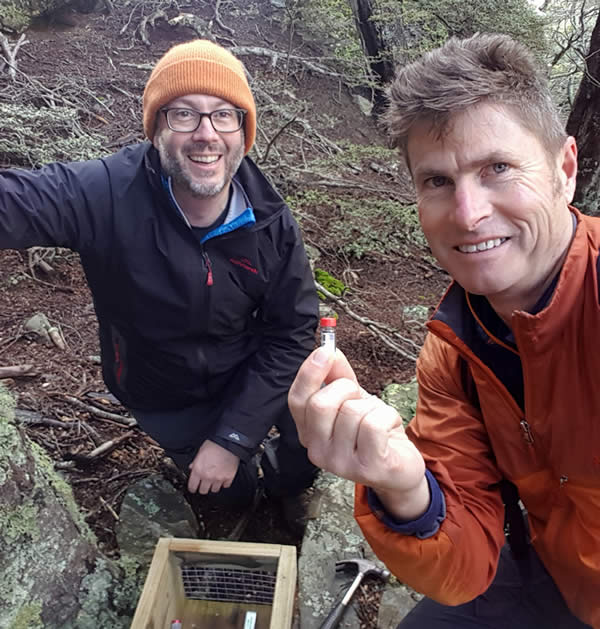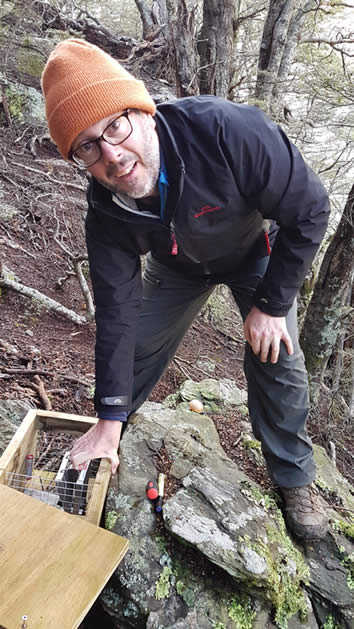KiwiNet News 5 November 2018
New innovative rat lures attract global interest
Wellington, 5 November 2018
Wellington researcher Dr Michael Jackson is a step closer to seeing his innovative, sustained-release rat lure products on the global pest control market, with assistance from the KiwiNet Emerging Innovator Programme. Jackson received the $25,000 award to aid the commercialisation of his new lures which emit chemical compounds that he and his colleagues identified are attractive to rats, one of the world’s most damaging pest mammals.

Dr Michael Jackson - Postdoctoral Research Fellow School of Biological Sciences, Victoria University of Wellington
Dr Jackson from the School of Biological Sciences at Victoria University of Wellington is leading a research project team to transform a number of chemical compounds they have identified as attractive to rats into viable, commercially available products. The chemical compounds are being put into easy-to-use pest control products that emit the compounds in a controlled and sustained manner over extended time periods, thus offering users a time and cost saving replacement for traditional, perishable lures.
Dr Jackson says, “Wild rodents are a significant global pest problem. We are developing rat lure products that deliver a sustained release of attractive chemical compounds over an extended time-period. The problem with traditional rat lures, and lures for other pest mammals, is that they are perishable foods like peanut butter that mould or get eaten by non-target animals. This means they’re only effective for a few days before they need to be replenished, which is costly and time consuming.”
Viclink, the commercialisation arm of Victoria University of Wellington, have worked closely with Dr Jackson and his team to develop a strategy to commercialise this novel approach to pest control. With funding and additional commercialisation assistance from KiwiNet through the KiwiNet Emerging Innovator Programme, Dr Jackson has been able to assess channel-to-market options, secured interest from key local and international industry players, and engaged with a commercial partner to undertake a range of commercial activities.
Dr Jackson says, “Being supported by KiwiNet to undertake market analysis and validation has been invaluable. I’ve been able to talk to, and collaborate with, potential partners across the globe who have extensive experience in developing and selling pest control products. I wouldn’t have been able to do this without KiwiNet’s support”.
“Dr Jackson’s new long-life lures represent a fantastic export opportunity for New Zealand. There is keen interest in the global pest control market for new technologies that are more effective than traditional kill-trapping methods using food-based products,” says Dr James Hutchinson, CEO of KiwiNet. “We’re delighted to have helped the commercialisation of this important technology which will have applications in a range of settings including conservation, agriculture, food storage and processing, and human and animal health.”
KiwiNet has also awarded a further $25,000 PreSeed Accelerator Funding for the project.

Dr Michael Jackson with Phil Green, a volunteer for the Wakatipu Wildlife Trust, Queenstown

Dr Michael Jackson
Dr Jackson started his research into semiochemical (signalling) compounds in 2014 for his PhD thesis which he completed in 2017. Jackson, along with colleagues Associate Professor Wayne Linklater and Dr Rob Keyzers from Victoria University of Wellington’s Centre for Biodiversity and Restoration Ecology, were awarded $360,000 last year from the Department of Conservation to help develop their lures through the Predator Free 2050 Tools to Market fund, designed to make more available the tools needed to achieve New Zealand’s Predator Free 2050 goal. The funding enabled the team to begin the process of transforming their initial research into viable products.
Viclink’s early engagement with Jackson’s team and other partners such as DOC and KiwiNet has ensured the research and development of the lures has progressed hand-in-hand with assessment of market need for this product, and patent applications which have been filed to protect the invention’s intellectual property.
“Viclink have invested significantly in this project and we’ve had fantastic support from DOC and KiwiNet, to ensure this early stage technology can be incorporated into a variety of easy to use product options that make a real impact in society,” says Dr Janice Cheng from Viclink who works alongside Dr Jackson. “The global pest market is growing fast and expected to reach US$28 billion in 2026. We’re really excited about the commercial interest from potential partners around the world already.”
The KiwiNet Emerging Innovator Programme is open to early career researchers based at universities and Crown Research Institutes across New Zealand. Programme recipients receive expert legal advice from KiwiNet corporate partner MinterEllisonRuddWatts and IP advice from Baldwins. The Norman Barry Foundation, which owns the Quality Hotel Parnell Limited, provided a donation of $25,000 for Michael’s work.
John Smith, Chairman of the Norman Barry Foundation, “It’s been wonderful to assist Michael to undertake a variety of commercialisation activities that will see his research turn into valuable pest control product products on the world stage.”
For further information please contact:
Sandra Lukey
Shine Group (PR for KiwiNet)
Cell: +64 21 2262 858
Email: sandra@shinegroup.co.nz
About Predator Free 2050 Tools to market
The Government announcement of its Predator Free 2050 goal in 2016 included specific investment in tools development for predator management, managed by the Department of Conservation. Dr. Jackson leads one of five product development projects funded by Tools to market since 2017, including lures, improved toxins, and automated predator detection. Budget 2018 increased the funding available for Tools to market by an additional $2.1 million over the next three years. This will enable expanded investment where tool availability can be accelerated and be ready for use in the short to medium term (e.g. 1-5 years).
About KiwiNet Emerging Innovator Programme
The KiwiNet Emerging Innovator Programme was established in 2015 by KiwiNet with the generous philanthropic support of the Norman Barry Foundation. The aim of the Emerging Innovator Programme is to have more scientists with disruptive new ideas working alongside businesses to solve industry challenges. It is open to scientists from public research organisation who demonstrate a clever new idea and a willingness to work closely with industry as they develop a prototype. The KiwiNet Emerging Innovator Programme is available to early career researchers based at universities and Crown Research Institutes across New Zealand.
About the Norman Barry Foundation
The Norman Barry Foundation, is a charitable trust registered under the Charities Act 2005. Norman Barry was an entrepreneur and a philanthropist who established the Quality Hotel Parnell. During his successful business career, he mentored motel owners in Auckland who were new to the industry and helped various charitable organisations in the form of donations. Norman left his shareholding in Quality Hotel Parnell Limited to the Foundation, and the distributions from this Company to the Foundation are used for charitable donations. In addition, Quality Hotel Parnell Limited is also a registered charity in its own right and this company also makes donations to the community.
